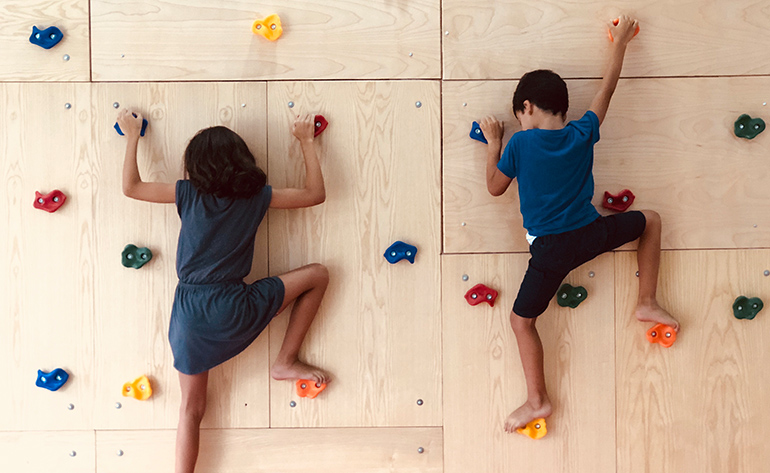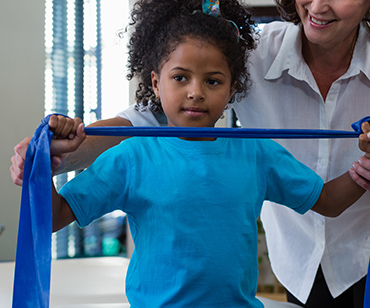
Athletic Therapy
Certified Athletic Therapists are best known for their quick-thinking on-field emergency care of professional and elite athletes. The first to respond when someone gets hurt, they are experts at injury assessment and rehabilitation. It’s that same mix of on-site care and active rehabilitation skills that makes Athletic Therapists so effective in treating the musculoskeletal (muscles, bones, and joints) injuries of all Canadians, whether on the field or in the clinic.
Athletic therapists adhere to the Sports Medicine Model of care. They treat a wide range of patients, including kids with concussions to acute or chronic injuries, whether they happened during the sport/activity or not. AT’s use various manual therapies, modalities, exercise prescription and even bracing and taping. The treatment varies but the objective doesn’t: an Athletic Therapist's goal is to help clients return to their usual activities, whether that means playing competitive sports or doing recreational activities.

Conditions Treated
Athletic Therapy can help kids with the following conditions and more:
- Sports injuries (prevention and rehab - ligament sprains and tendon/muscle strains, fractures and other bone injuries, contusions, tendonitis, acute injuries, chronic/overuse injuries)
- Specialized sports taping, bracing and supports
- Concussion assessment, rehabilitation & prevention (vestibular rehab, post-concussion return to sport/play guidance and support)
- Prehab before orthopedic surgery
- Rehab after orthopedic surgery
- Biomechanical assessments during sport
- Proper sport equipment fitting and suggestions (ie: helmets)
- Emergency Care and response during sport events and practices
-
What does an Athletic Therapist do?
Athletic Therapy covers a full spectrum of therapy skills and modalities including: Prevention. Athletic Therapists help to prevent or minimize the possibility of injury using strategies and techniques such as patient education, conditioning programs, postural evaluation, and equipment selection Assessment. Athletic Therapists are experts at evaluating the type and severity of injuries using established best practices Emergency & Acute Care. Usually the first to respond when an injury occurs, Athletic Therapists provide basic emergency life support, recognize and manage acute traumatic neurological dysfunction, and prepare individuals for entry into the healthcare system Rehabilitation. Preparing individuals to re-establish their pre-injury lifestyle, Athletic Therapists take an active approach to rehabilitation, including manual and movement therapies, electrical modalities, and targeted exercises to ensure musculoskeletal stability and function Reconditioning. Athletic Therapists work with individuals on a customized basis to condition for preventive measures and re-condition with exercise rehabilitation to avoid further injury
-
Is there insurance coverage for Athletic Therapy?
Yes, many insurance companies in Ontario cover Athletic Therapy in their plans. If you’re not sure, please contact your insurance provider to inquire. To qualify, the services must be provided by a Certified Athletic Therapist - CAT(C).
-
Do I need a referral before coming to see an Athletic Therapist?
No, we can see your child without one, however, your insurance company may require one to reimburse the cost of the services. If you don’t have a chance to see your doctor first, we can still treat your child; we can provide a detailed note with the clinical findings to your physician so s/he may provide you with a referral.
-
Did my injury have to occur during sport to be seen by an Athletic Therapist?
No. However your injury happened, an Athletic Therapist can do a thorough, comprehensive assessment and offer a treatment plan to help you recover.
-
Does my child have to have an injury to see an Athletic Therapist?
No, a huge part of the scope of practice of an Athletic Therapist is PREVENTING injuries, or addressing issues before they become limiting and debilitating. If you’re concerned about anything related to your child’s strength, balance, posture or movement patterns, an Athletic Therapist can help devise a treatment plan to support your child to prevent an injury, or prepare for orthopedic surgery.
-
What will an Athletic Therapy assessment look like for my child?
After having reviewed your intake and consent forms, your therapist will ask you and/or your child more pertinent questions about his/her issue and his/her goals for therapy. Next, the therapist will assess your child using a variety of diligently chosen outcome measures, special tests, and observation of your child moving, walking, running, or playing. The information gathered from these activities will help your therapist to prepare an individualized and developmentally appropriate treatment plan for your child. Your therapist may also suggest additional tests or a referral to another specialist.
-
What will my child do during an Athletic Therapy treatment session?
After the treatment plan has been created, you will decide with your therapist which treatment options will work best for your child. Most therapy sessions incorporate regaining optimal range of motion, strengthening, balance training, proprioception, conditioning, core work, vestibular training, and sport specific activities and exercises (depending on the nature of the injury and stage of healing). The therapist will carefully select exercises, games, modalities, tools and sport-related activities that will help your child work toward achieving his/her therapy goals and that teach your child how to move properly. If there are certain things that your therapist will need to observe ‘in action’ but may not be able to, they may arrange to have you record them during a game or practice to help with analysis and further refinement of the treatment plan.
-
What is the difference between an Athletic Therapist and a Physiotherapist?
There are similarities for both, such as assessing and treating musculoskeletal injuries and ailments, and often using the same modalities for rehab and recovery. But there are also some differences. Physiotherapists with basic training have not acquired the same level of skill and knowledge with respect to sport injury and reconditioning measures that an Athletic Therapist would possess. An Athletic Therapist with basic training does not have the skills and education to assess and offer treatment plans for various pediatric developmental or congenital conditions. However, working as a team with a Physiotherapist, an Athletic Therapist could assist with executing treatment plans which are focused on exercise. If you’re not sure who should treat your child, book a discovery call so we can match you with the appropriate therapist.


